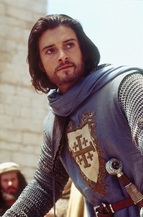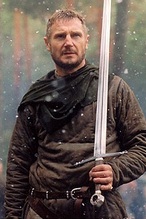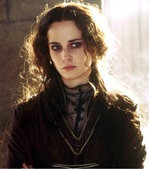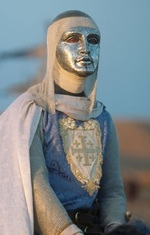“The religion of one seems madness unto another.”
-- Thomas Browne, Sr.
-- Thomas Browne, Sr.
 Bloom as Balian
Bloom as Balian Kingdom of Heaven is a movie about religion first and foremost. It dramatizes a religiously-motivated event from the past all while looking at it through the prism of the present and delivers a pretty obvious message in the process. It plays somewhat against type with its casting (although Liam Neeson seems at home in whatever past-his-prime badass you care to place him in) but Ridley Scott's talented direction is enough to overcome most of these deficiencies (but not all; Orlando Bloom and rousing speeches are antitheses). When viewed on its surface, KoH is a mediocre tale of valiant knights vs. evil ones, a story with a few glaring flaws that should have been addressed in a re-write, but with the subtext thrown in, it elevates itself to much more.
 Neeson as Godfrey
Neeson as Godfrey Orlando Bloom plays Balian, a humble town blacksmith. The movie hits us with his entire backstory in pretty much the first five minutes, a necessary evil for the amount of ground we have to cover after this. Over the rest of the movie's events in Jerusalem, Balian's status as an outsider mirrors our own, and is an easy way to make us identify with the character. In fact, it is an almost necessary one, as Bloom's almost total lack of charisma won't make us cheer for him on its own. What he marvels at, so do we, and what he rebels against, we look on as backwards. His is a barely masked modern viewpoint to speak for the audience in almost all scenes. His whirlwind backstory is followed by a whirlwind progression to knighthood, and from there, if you've managed to keep up, we're off to the races. Liam Neeson plays Balian's father, Godfrey, a fact that we and Balian are introduced to at the same time. Godfrey's search for his heir and desire to bring him back to Jerusalem is the impetus that sets the rest of the film in motion. Indicative of the ridiculously fast transformations the movie will show itself to be so fond of, Godfrey turns Balian from a man who's minimally able with a sword, into a master swordsman in one scene.
 Green as Sibylla
Green as Sibylla Once in Jerusalem, he is quickly introduced to Tiberius, played by Jeremy Irons, and then to the King of Jerusalem himself. The King (Baldwin IV to be specific) suffers from leprosy, which requires him to wear a mask concealing his face. If you didn't know ahead of time that the King was played by Edward Norton, the familiarity of his voice would haunt you for the entire viewing. Where Norton excels is in the inflections of his voice, slightly exaggerated to convey the emotion concealed by the mask. The movements of his head are a little over the top, but not particularly distracting. His quiet calm presiding over a very tenuous approximation of freedom of religion is the utopia the movie makes clear man's nature will never allow him to achieve. Eva Green plays his sister, Sibylla, a character the movie can't quite decide what it wants to do with. Green does her best, but the script's indecisiveness comes across in her portrayal.
 Norton as Baldwin IV
Norton as Baldwin IV The movie's events set our main characters at odds with Saladin, a warlord who has brought organization to the Muslims and vowed to retake the city. Between Saladin and Baldwin IV, the peace could go on forever, but they are helpless against the inexorable tide of man's desire for violence, personified in this case by Guy de Lusignon and his croney, Reynald de Chatillon. These two are so one-dimensionally in favor of war, constantly straddling the line between fanatical warmongers and completely unbelievable, that they occasionally seem like caricatures. Both actors (Marton Csokas and Brendan Gleeson) give it their all, and the sheer zealotry/bloodthirstiness they play the roles with distracts from the fact that they're not fully developed characters. The theme of nobility being helpless in the face of greed and evil pops up at every turn, and combined with the film's heavy-handed message about religion almost chokes the entertainment out of it. Ultimately, some fine performances and Scott's direction help KoH to avoid this fate, but the film's moral is clear: there can be no religion with a God in which men do not kill in his name.
A flawed movie that is more about the message than the delivery, but is still quite enjoyable.



 RSS Feed
RSS Feed